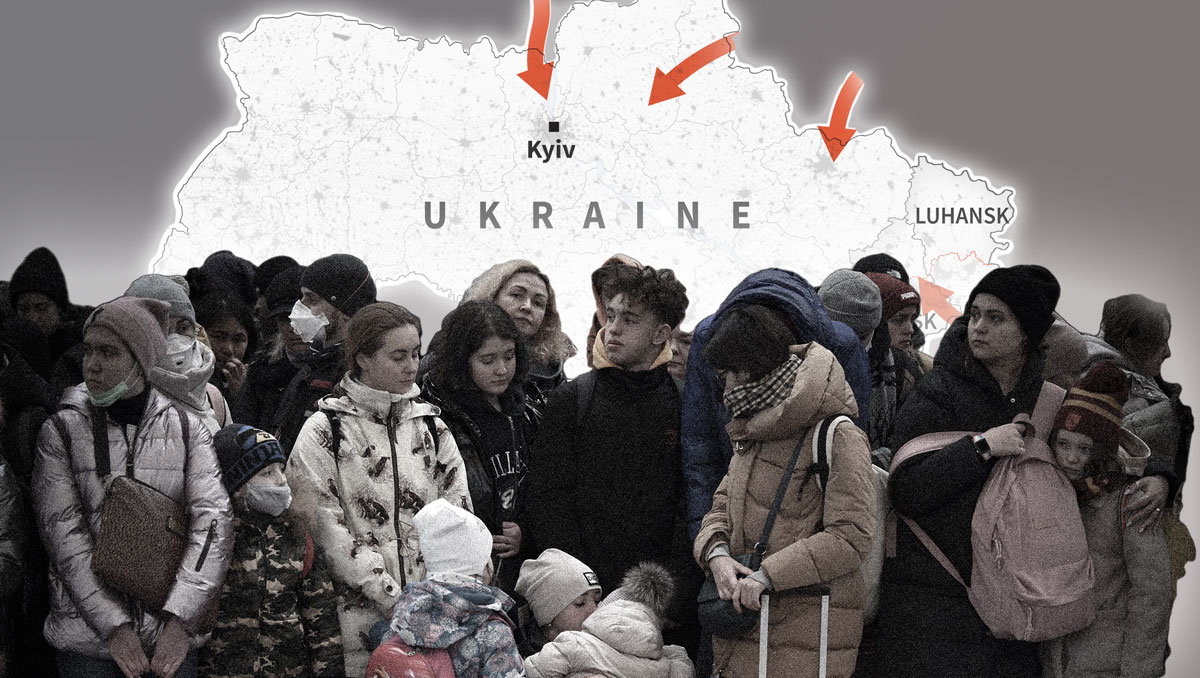
Above: PhotoCollage sources- Reuters / Lynxotic
“Peace is the only way to halt this tragedy,” said the U.N. high commissioner for refugees.
The United Nations Refugee Agency said late Wednesday that Russia’s deadly assault on Ukraine has forced more than a million people to flee the country in just a week, a humanitarian crisis that the organization warned will get exponentially worse if the war continues.
“Unless there is an immediate end to the conflict, millions more are likely to be forced to flee Ukraine.”
“In just seven days, one million people have fled Ukraine, uprooted by this senseless war,” Filippo Grandi, the U.N. high commissioner for refugees, said in a statement. “I have worked in refugee emergencies for almost 40 years, and rarely have I seen an exodus as rapid as this one. Hour by hour, minute by minute, more people are fleeing the terrifying reality of violence. Countless have been displaced inside the country.”
“And unless there is an immediate end to the conflict, millions more are likely to be forced to flee Ukraine,” added Grandi. “International solidarity has been heartwarming. But nothing—nothing—can replace the need for the guns to be silenced; for dialogue and diplomacy to succeed. Peace is the only way to halt this tragedy.”
The agency’s stark assessment of the crisis in Ukraine came as Russia ramped up its attack on the country, seizing control of a major port city, hammering densely populated areas with shelling and airstrikes, and continuing its advance on the capital Kyiv. Russian bombs and artillery fire have reportedly damaged and destroyed Ukrainian schools, residential and administrative buildings, and hospitals.
The U.N. human rights office said Wednesday that through March 1, at least 227 civilians were killed and more than 500 were injured in Russia’s invasion, which shows no signs of abating despite the West’s intensifying financial sanctions targeting aspects of Russia’s economy as well as the country’s political leaders and oligarchs.
“In the cities and streets of Ukraine today, innocent civilians are bearing witness to our Age of Impunity,” David Miliband, president and CEO of the International Rescue Committee (IRC), said Wednesday. “The fact that 1 million refugees have already been forced to flee is a grim testament to barbaric military tactics taking aim at homes and hospitals. The IRC is calling on the Russian government to immediately cease all violations of the laws of war to spare additional harm to civilians and avoid further displacement.”
“As war rages across Ukraine and the world bears witness to a displacement crisis at a scale rarely seen in history,” Miliband continued, “it is urgent that Europe not just offer protection to Ukrainian nationals who have visa-free access to the E.U., but to also grant non-discriminatory pathways to safety to people of all citizenship and nationalities facing grave dangers inside Ukraine.”
Human Rights Watch echoed that sentiment in a statementearlier this week, declaring that it is “vitally important for all countries neighboring Ukraine to allow everyone to enter with a minimum of bureaucratic procedures.” The group also pointed with alarm to reports that Africans and other foreign nationals have faced racist abuse and discrimination from authorities as they’ve attempted to escape violence in Ukraine.
“This is a landmark moment for Europe, and an opportunity for the European Union to remedy the wrongs of the past and rise to the occasion with genuine compassion and solidarity,” said Judith Sunderland, associate Europe and Central Asia director at Human Rights Watch. “That requires a truly collective commitment to keeping the door and our hearts open to everyone fleeing Ukraine.”
On Tuesday, U.S. Rep. Alexandria Ocasio-Cortez (D-N.Y.) argued in an interview that the United States should join European countries in welcoming Ukrainian refugees.
“The world is watching, and many immigrants and refugees are watching,” Ocasio-Cortez said. “How the world treats Ukraine and Ukrainian refugees should be how we are treating all refugees in the United States.”
“We really need to make sure that, when we talk about accepting refugees, that we are meaning it, for everybody, no matter where you come from,” the New York Democrat added.
During a press briefing last week, White House Press Secretary Jen Psaki told reporters that the Biden administration is “working in close lockstep with our European counterparts about what the needs are and how to help, from our end, meet those needs.”
“Our assessment is that the majority of refugees will want to go to neighboring countries in Europe, many of which have already conveyed publicly that they will accept any refugee who needs a home, whether it’s Poland or Germany, and there are probably others who have made those comments,” Psaki added. “That certainly means an openness to accepting refugees from Ukraine but also making sure that all of these neighboring countries who are willing to welcome these refugees, you know, have our support in that effort.”
Psaki declined to provide an “anticipated number” of Ukrainian refugees that the Biden administration would be ready to accept.
Originally published on Common Dreams by JAKE JOHNSON and republished under a Creative Commons license (CC BY-NC-ND 3.0).
Related Articles:
- Is 2023 the year for Virtual Reality Workouts?
- Fitness with Apple Watch: A Day in the Life of Highly Motivated Ring Closers
- Goodbye Twitter, Hello Mastodon!
- The Vision of Steve Jobs for the Future of Apple has Barely Begun to Emerge
- Is This Jason Statham Video Real or Deepfake TikTok Account? You Decide
Enjoy Lynxotic at Google News and Apple News on your iPhone, iPad or Mac.
Find books on Music, Movies & Entertainment and many other topics at our sister site: Cherrybooks on Bookshop.org
Lynxotic may receive a small commission based on any purchases made by following links from this page